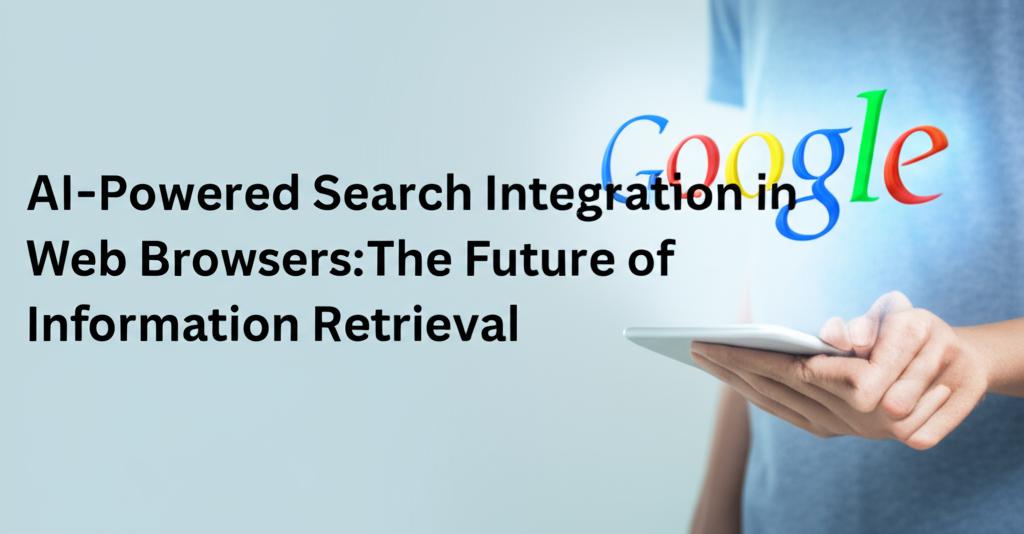The way we find information online is undergoing a significant transformation, largely driven by the integration of Artificial Intelligence (AI) into web browsers. This shift promises a more intuitive, personalized, and efficient search experience.
The Evolution from Keywords to ConversationsTraditional search engines primarily rely on keywords. Users input terms, and the engine matches those to indexed web pages. While effective, this often requires users to sift through multiple links to find precisely what they need. AI-powered search, however, aims to understand user intent on a deeper level. Natural Language Processing (NLP) allows these advanced search tools to interpret conversational queries, much like asking a question to a knowledgeable assistant. This means users can ask full questions and receive more direct, contextual, and relevant answers.
Key Ways AI is Reshaping Browser Search:- Enhanced Personalization: AI algorithms analyze browsing history, location, device type, past searches, and even real-time behavior to tailor search results and content suggestions. This creates a more individualized and engaging web experience. For example, two users searching for the same topic might receive different results based on their unique profiles and interests.
- AI-Generated Summaries and Direct Answers: Instead of just a list of links, AI-powered browsers can compile concise summaries of information from multiple sources. This is designed to provide quick, digestible overviews, reducing the need to click through numerous pages. Google's AI Overviews (formerly Search Generative Experience or SGE) and an increasing number of AI browsers are examples of this trend.
- Multimodal Search Capabilities: The future of search isn't limited to text. AI enables browsers to process and understand queries in various formats, including images (visual search), voice commands, and even videos. This makes searching more accessible and intuitive, especially on mobile devices.
- Intelligent Search and Contextual Insights: AI can analyze the content of web pages you're viewing to provide contextual insights and related information. If you're reading an article, your browser might suggest related topics, statistics, or background information to enhance your understanding.
- Improved Efficiency and Accuracy: By better understanding user intent and filtering out irrelevant information, AI aims to deliver more targeted and accurate search results, saving users time and effort. Some AI search tools claim to significantly reduce search time by providing direct answers.
- Conversational Follow-Up: AI search tools are increasingly capable of handling follow-up questions, adjusting responses based on the previous queries in the conversation. This creates a more interactive and tailored search experience.
- Enhanced Security: AI-driven browsers can play a more active role in identifying and blocking phishing attempts, malicious websites, and suspicious downloads in real-time by learning from emerging cyber threats.
- Writing Assistance: Some browsers are integrating AI-assisted writing features, offering grammar and spell checks, tone analysis, and suggestions for improving written content directly within the browser.
Tech giants like Google (with Gemini and AI Overviews in Chrome), Microsoft (integrating OpenAI's technology into Bing and Edge), and Apple (reportedly exploring AI-powered search for Safari) are heavily investing in AI-driven search. New entrants like Perplexity AI are also making their mark by offering AI-native search experiences that prioritize direct answers and source transparency. Chrome Enterprise is also integrating AI for enterprise-level search, helping employees find information across various work applications.
Projections indicate a significant increase in AI-driven searches in the coming years, with some reports suggesting that a substantial percentage of online searches will be influenced by AI.
Challenges and Considerations:Despite the numerous benefits, the rise of AI-powered search also brings challenges:
- Data Privacy: AI's reliance on user data for personalization raises privacy concerns. Ensuring data is handled responsibly and transparently is crucial.
- Algorithmic Bias: AI models can inadvertently perpetuate biases present in their training data, potentially leading to skewed or unfair results if not carefully monitored and mitigated.
- Monetization: The shift from a link-based model with adjacent advertisements to direct AI-generated answers presents a monetization challenge for search providers. New models like sponsored follow-up questions or subscription services are being explored.
- Reduced Website Traffic: As AI provides direct answers, users might click through to source websites less often, potentially impacting websites reliant on visitor traffic for revenue and visibility.
- Quality of AI-Generated Content: There are concerns about the accuracy and reliability of AI-generated content, especially if AI models are trained on other AI-generated content, creating a potential feedback loop of artificial information. Techniques like Retrieval-Augmented Generation (RAG), which anchor AI responses to reliable external sources, are being developed to address this.
- Dependence on Quality Data: The effectiveness of AI search heavily relies on the quality of the data it's trained on. Inaccurate or flawed data can lead to misleading information.
For businesses and content creators, the rise of AI-powered search necessitates a shift in strategy. Focusing on high-quality, well-researched, and engaging content optimized for natural language queries will be paramount. Utilizing structured data and schema markup can also help AI better understand and categorize information.
Conclusion:AI-powered search integration in web browsers is undeniably reshaping the future of information retrieval. It promises a more personalized, efficient, and conversational way to interact with the vast amount of information available online. While challenges remain, the continued evolution of AI technology suggests that our browsers will become increasingly intelligent partners in our quest for knowledge, moving beyond simple keyword matching to a more profound understanding of our needs and intentions. As this technology matures, it will be crucial for both users and developers to adapt to and harness its full potential while navigating the associated ethical and practical considerations.

